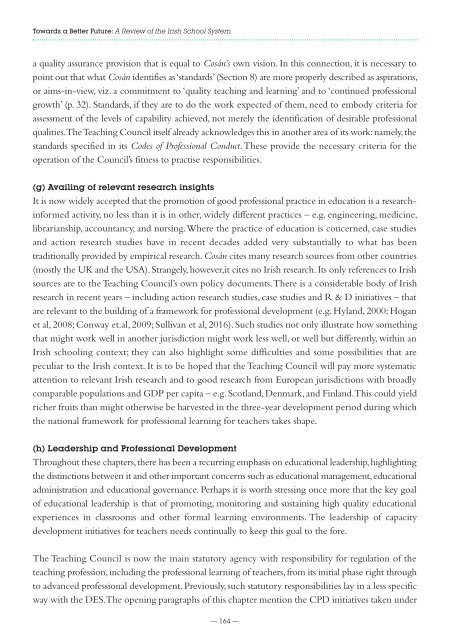Towards a Better Future
A Review of the Irish School System John Coolahan | Sheelagh Drudy Pádraig Hogan | Áine Hyland | Séamus McGuinness
A Review of the Irish School System
John Coolahan | Sheelagh Drudy Pádraig Hogan | Áine Hyland | Séamus McGuinness
Create successful ePaper yourself
Turn your PDF publications into a flip-book with our unique Google optimized e-Paper software.
<strong>Towards</strong> a <strong>Better</strong> <strong>Future</strong>: A Review of the Irish School System<br />
a quality assurance provision that is equal to Cosán’s own vision. In this connection, it is necessary to<br />
point out that what Cosán identifies as ‘standards’ (Section 8) are more properly described as aspirations,<br />
or aims-in-view, viz. a commitment to ‘quality teaching and learning’ and to ‘continued professional<br />
growth’ (p. 32). Standards, if they are to do the work expected of them, need to embody criteria for<br />
assessment of the levels of capability achieved, not merely the identification of desirable professional<br />
qualities. The Teaching Council itself already acknowledges this in another area of its work: namely, the<br />
standards specified in its Codes of Professional Conduct. These provide the necessary criteria for the<br />
operation of the Council’s fitness to practise responsibilities.<br />
(g) Availing of relevant research insights<br />
It is now widely accepted that the promotion of good professional practice in education is a researchinformed<br />
activity, no less than it is in other, widely different practices – e.g. engineering, medicine,<br />
librarianship, accountancy, and nursing. Where the practice of education is concerned, case studies<br />
and action research studies have in recent decades added very substantially to what has been<br />
traditionally provided by empirical research. Cosán cites many research sources from other countries<br />
(mostly the UK and the USA). Strangely, however,it cites no Irish research. Its only references to Irish<br />
sources are to the Teaching Council’s own policy documents. There is a considerable body of Irish<br />
research in recent years – including action research studies, case studies and R & D initiatives – that<br />
are relevant to the building of a framework for professional development (e.g. Hyland, 2000; Hogan<br />
et al, 2008; Conway et.al, 2009; Sullivan et al, 2016). Such studies not only illustrate how something<br />
that might work well in another jurisdiction might work less well, or well but differently, within an<br />
Irish schooling context; they can also highlight some difficulties and some possibilities that are<br />
peculiar to the Irish context. It is to be hoped that the Teaching Council will pay more systematic<br />
attention to relevant Irish research and to good research from European jurisdictions with broadly<br />
comparable populations and GDP per capita – e.g. Scotland, Denmark, and Finland. This could yield<br />
richer fruits than might otherwise be harvested in the three-year development period during which<br />
the national framework for professional learning for teachers takes shape.<br />
(h) Leadership and Professional Development<br />
Throughout these chapters, there has been a recurring emphasis on educational leadership, highlighting<br />
the distinctions between it and other important concerns such as educational management, educational<br />
administration and educational governance. Perhaps it is worth stressing once more that the key goal<br />
of educational leadership is that of promoting, monitoring and sustaining high quality educational<br />
experiences in classrooms and other formal learning environments. The leadership of capacity<br />
development initiatives for teachers needs continually to keep this goal to the fore.<br />
The Teaching Council is now the main statutory agency with responsibility for regulation of the<br />
teaching profession, including the professional learning of teachers, from its initial phase right through<br />
to advanced professional development. Previously, such statutory responsibilities lay in a less specific<br />
way with the DES. The opening paragraphs of this chapter mention the CPD initiatives taken under<br />
— 164 —



